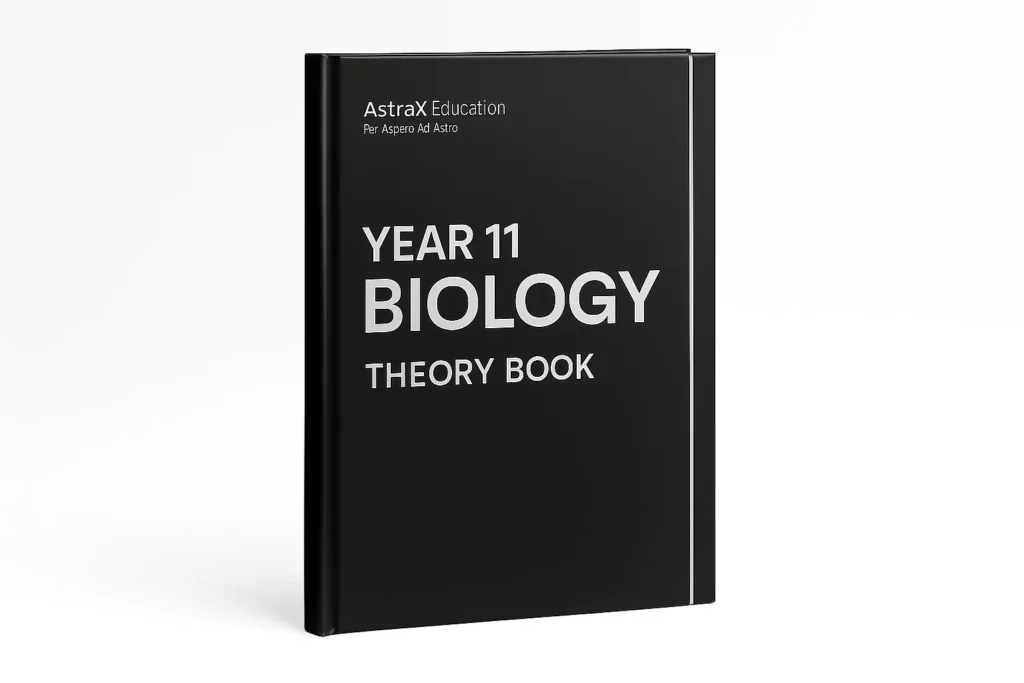Year 11 Biology Tutoring in NSW & Online
Transform content memorisation into sophisticated analysis – the difference between Band 4 and Band 6
Year 11 Biology punishes students who rely on memorisation alone. While they’re cramming facts, Band 6 students are mastering scientific analysis, evaluation skills, and sophisticated response techniques. Medicine and health science courses demand Biology excellence, but most students never learn how to think like scientists. Our program develops the analytical frameworks and exam techniques that turn Biology into a high-scoring advantage

Weekly Theory Lessons with Premium Booklets
Students receive expertly structured weekly lessons supported by comprehensive booklets. These materials are designed to help students become top performers by mastering core concepts step-by-step. We conduct regular assessments and provide live, interactive feedback to ensure every child progresses confidently.

Online Learning That Works.
Our online classes deliver the same (or better) results as face-to-face learning. No time wasted on travel, flexible scheduling, access to recordings, and consistent access to Sydney’s best tutors—right from your home.

Expert Teachers Who Know the NSW Syllabus
Our tutors are handpicked specialists who not only understand the syllabus but also know how to teach it in a way that clicks. Their experience and personalised approach make all the difference.

Term-by-Term Outline
Cells as the Basis of Life (Oct–Dec)
This foundational module introduces students to the molecular and cellular components of life. Students explore cell structures, transport mechanisms, and biochemical processes essential to sustaining living systems.
- Cell structure and function: Eukaryotic and prokaryotic cells, organelles
- Membranes and transport: Diffusion, osmosis, active transport
- Enzymes and biochemical reactions: Catalysis, energy transformations, photosynthesis and respiration
Outcome:
Students will develop a strong understanding of the biochemical and structural components of cells, forming a foundation for all future biological learning.- Cell structure and function: Eukaryotic and prokaryotic cells, organelles
Organisation of Living Things (Feb–Apr)
This module explores how organisms are structured and how body systems support life. Students study multicellular organisation, transport systems, and the classification of life.
- Plant and animal systems: Gas exchange, nutrient transport, homeostasis
- Levels of biological organisation: Cells → tissues → organs → systems
- Classification and biodiversity: Binomial nomenclature, evolutionary relationships
- Focus on human body systems: Circulatory, digestive, respiratory
Outcome:
Students will understand how structure supports function in living organisms, and how biodiversity is classified and studied in biological systems.- Plant and animal systems: Gas exchange, nutrient transport, homeostasis
Biological Diversity (Apr–Jun)
This module examines how life has evolved over time and the processes that drive diversity. Students explore natural selection, fossil evidence, and mechanisms of speciation.
- Evolution and natural selection: Darwin’s theory, adaptations, selection pressures
- Fossils and DNA evidence: Comparative genomics, evolutionary timelines
- Speciation and genetic variation: Isolation, drift, and reproductive barriers
Outcome:
Students will be able to explain the processes that lead to biological diversity and interpret evidence for evolution using both historical and molecular data.
Ecosystem Dynamics (Jul–Sept)
The final term introduces ecology and environmental science. Students study how energy flows through ecosystems and how populations and environmental factors interact.
- Food chains, food webs, and energy pyramids
- Biotic and abiotic interactions: Predation, competition, climate factors
- Ecosystem models: Population dynamics, ecological succession
- Human impacts and conservation strategies
Outcome:
Students will gain the skills to analyze environmental interactions, interpret ecological data, and understand the dynamic nature of ecosystems.
What's Included
Weekly Lessons with Expertly Designed Theory Booklets
Each week, students are guided through structured theory lessons supported by high-quality, syllabus-aligned booklets. These booklets are designed to develop deep understanding and help students become top performers.
Specialist Tutors, Not Just Generalists
Our teachers are subject-matter experts who know how to break down complex topics and explain them clearly. They focus on building your child’s confidence and capability week by week.
Progress Monitoring with Individual Feedback
Our tutors continuously monitor student progress in class and through lesson work, offering personalised feedback and support where it’s needed most.
Small Class Sizes for Real Attention
Our group classes are capped to 5 students per class to ensure students receive the right level of support and engagement. Every student is seen, heard, and supported.
Expert Academic Support for Parents
We keep parents in the loop with regular updates and offer guidance on how to support your child’s learning journey at home and beyond.
First Lesson Money-Back Guarantee
Try AstraX with peace of mind—if you're not satisfied after the first lesson, we'll refund you. No stress, no risk
Pricing
Group Classes (Maximum 5 Students)
Term Course: 12 weekly lessons-
Maximum of 5 students per class for optimal attention
-
NSW syllabus-aligned content, covering key focus areas
-
Theory and workbook
-
Free trial session available
1-on-1 Private Tutoring
Term Course: 12 weekly lessons-
Complete, personalized attention for each student
-
NSW syllabus-aligned content
-
Tailored lesson plans for accelerated learning
-
Theory and workbook
-
Free trial session to experience our approach
EXCELLENTTrustindex verifies that the original source of the review is Google. A really cooperative environment to work in! Staff are very friendly and will help you whenever you need.Trustindex verifies that the original source of the review is Google. Finally seeing real progress Honestly didn't think we'd find anything that would help my daughter but AstraX proved me wrong. She went from barely passing English at 65% to getting 80% last term. What I love most is how patient the teachers are - they actually take time to explain things until she gets it. No rushing, no making her feel stupid. Online classes are a lifesaver for us working parents too. Just grateful we found them.Trustindex verifies that the original source of the review is Google. I am writing this review for AstraX Education because my son is getting very good results. The teachers are very sincere people, treating students like their own family. When my son had exam tension, they were calling to give encouragement and support. This type of care you will not find in big tuition centers. Online class system is working very well. No need to drop and pick up, very convenient for parents My wife is very happy with this arrangement. All families in our community, I am telling them about AstraX. Very reliable and trustworthy center. If you want your children to get good marks and build confidence, definitely try AstraX Education. You will not regret.Trustindex verifies that the original source of the review is Google. AstraX Education – Exceptional Tutoring Experience AstraX Education has made a huge impact on my learning journey. The quality of tutoring provided by AstraX, particularly Shayekh and Zainul was amazing. I’ve had the privilege of being tutored by them at AstraX Education, and I can confidently say they are among the best tutors I’ve ever had. Before finding AstraX Education, I had some disappointing experiences with other tutors, but Shayekh and Zainul completely changed my perspective. Their passion for teaching and commitment to their students’ success are unmatched. Shayekh is an incredible tutor who has a remarkable ability to simplify difficult concepts. He doesn’t just teach; he ensures you truly understand every topic before moving forward. His structured approach to problem-solving helped me develop confidence in tackling even the most challenging math problems. What sets Shayekh apart is his calm and patient demeanor—he never rushes through explanations and always finds new ways to help students grasp the material. One of the things I admire most about Shayekh is his real-world approach to teaching mathematics. He connects theories to practical applications, making the subject engaging and meaningful. Learning from him has significantly improved not only my grades but also my overall problem-solving skills and logical thinking. Zainul is another phenomenal tutor at AstraX Education. His dedication and enthusiasm for teaching make every lesson both productive and enjoyable. He has a unique way of breaking down complex topics into simple, easy-to-understand concepts. Instead of just focusing on formulas and solutions, Zainul ensures you understand the “why” behind everything, which has deepened my appreciation for mathematics. What I appreciate most about Zainul is his adaptability. He tailors his teaching style to fit each student’s needs, ensuring that no one feels left behind. He is incredibly patient and willing to explain things in different ways until you fully grasp them. Thanks to his guidance, my confidence in math has skyrocketed, and my grades have improved significantly. AstraX go beyond just helping students achieve better grades—they inspire a genuine love for learning. Their teaching methods are engaging, effective, and tailored to ensure every student reaches their full potential. If you’re looking for an amazing tutoring service, I highly recommend AstraX Education. Whether you’re struggling with math or looking to excel further, Shayekh and Zainul are the best tutors you can find! Thank you to AstraX for the incredible service and dedication.
Ready to See the Difference? Book a Trial Lesson
Experience our proven teaching methodology with a complimentary trial lesson designed for your child's academic needs.
